Werewolves: Who Did You Kill Last Night?
*This story is a collaboration with radiichina, Anthony Tao helped out enormously with the editing.
“This game is all about secrets, lying and bluffing.”
Something we've noticed recently - werewolves are all the rage in China right now. That's at least partially thanks to the role-playing game “Werewolves” (狼人杀Langren sha), a variation of the classic party game mafia (called “Killers” in China, very popular several years back).
Briefly, here’s how it works:
Before the game starts, each player is secretly assigned a role (i.e. werewolf, villager, celestial, etc. — there can be many, depending on the number of players, including roles that aren’t in mafia or Killers). Then the game starts, and at “night,” players kill, save, spy, or sleep (keeping their eyes closed the entire time), depending on their role (this is done with nonverbal signals given to a neutral, all-seeing “host”). When the game moves from night to “day,” the host informs players of what happened during the night — i.e. so-and-so was killed by a werewolf, so-and-so was saved by a celestial — and the “surviving” players then debate the identities of the werewolves – or falsely implicate innocents – and vote to eliminate the suspects. The game proceeds for multiple rounds until one group, either the killers or the innocents, outnumber the other.
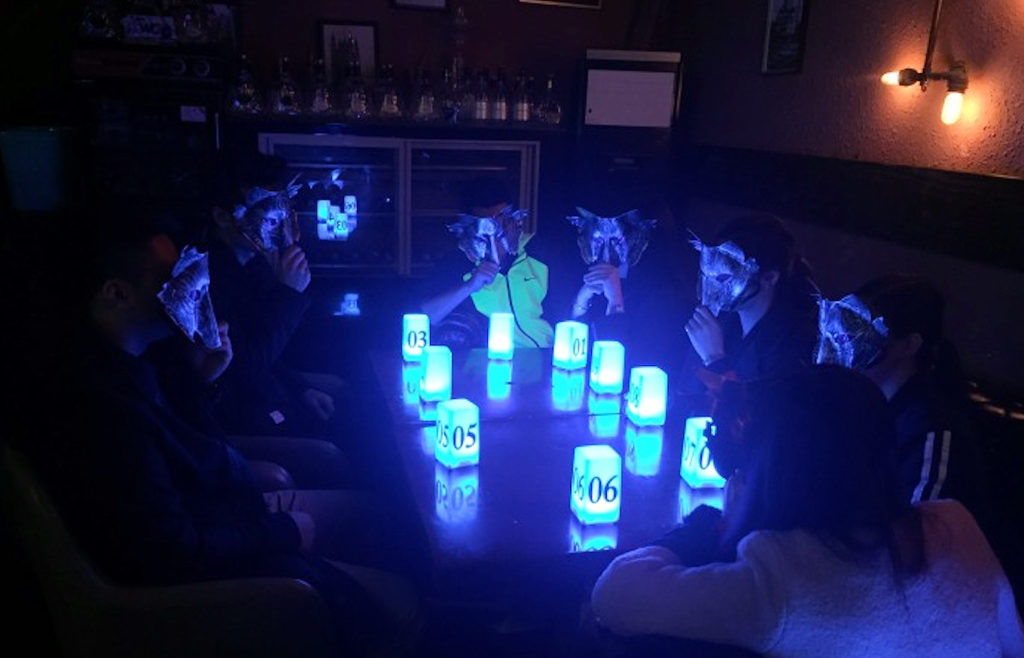
Being who we are - two curious Chinese girls trying to stay on top of the latest cultural and entertainment trends - of course we couldn't not check out this Werewolves fad. There are more than 100 Werewolves clubs in Beijing alone on the popular listings site Dianping, so we picked one near Yan’s house, owned by “JY.”
 JY, one of the most-adored online Werewolves celebrities known for his handsome gaming skills.
JY, one of the most-adored online Werewolves celebrities known for his handsome gaming skills.
![]() Biyi: JY? Is that someone I’m supposed to know?
Biyi: JY? Is that someone I’m supposed to know?
![]() Yan (shocking face): Where have you been? He is the Wolf King! Haven’t you watched his live stream?
Yan (shocking face): Where have you been? He is the Wolf King! Haven’t you watched his live stream?
![]() Biyi: Well I don’t watch live streams and don’t know how to play werewolf…
Biyi: Well I don’t watch live streams and don’t know how to play werewolf…
![]() Yan (rolling eyes): O-M-GGGG.
Yan (rolling eyes): O-M-GGGG.
Werewolves: From Watching to Playing
It’s only in the past year that the game has become the thing at parties and social gatherings across China. How?
We have to begin a bit further back. In June 2015, live streaming platform Zhanqi TV produced the first live Werewolf gaming show, Lying Man. A year later, Panda TV, the platform invested by young tycoon Wang Sicong, produced its own werewolf show, Panda Kill. By inviting well-known gamer celebrities, the two shows drew fans from China’s vast gaming community. For many hardcore Werewolf addicts, the game was a competition of wit and logic in which only the most perceptive and eloquent would prevail.

Livestreaming show PandaKill.

Werewolves livestream videos on Douyu.com.
But then the game went mainstream. MEWE 米未传媒, one of the most successful digital media/entertainment companies in the country founded by famed TV host Ma Dong 马东, produced the show “Dinner Party Seduction,” in which different Chinese celebrities sat around playing Werewolf. As it turned out, young Chinese audiences absolutely love watching famous people “kill” and bluff each other on camera; the show drew more than 6 million viewers for its first episode.

The popular Werewolves show "Dinner Party Seduction".
Very quickly, other entertainment shows began running werewolf segments of their own, and offline clubs like JY’s grew in popularity.

Searches for “Dinner Party Section” on Baidu — indicated by the green line below — eventually turned into searches for simply “werewolf,” indicated by the blue line.

Hey there JY Club!
JY club says online that it “warmly welcomes players from all levels,” so of course we dragged two other friends with us to give it a try. Stepping into the wolf-themed, futurist-looking house, we were ready to meet some players — you’re put into a room with either 9 or 12 people — and engage in a night of brutal killing.

Yan checking us in.
After registering our names at reception and ordering some drinks, staffers led us to one of their three gaming rooms. From furniture, lighting to sound effects, everything in the rooms was particularly arranged. The club even has a team of in-house “judges” specifically trained to host and moderate games (apparently, all of these judges are young, pretty girls in their early 20s… just so you know). Guests only need to sit there and prepare to kill… oh, while wearing wolf masks:

But here’s the thing: once you sit in that carefully arranged room with a bunch of solemn-looking strangers, the whole experience turns from a game into a hardcore, brain-churning exercise.
As we interrogated one another, it was interesting to see the ways people would try to talk themselves out of a guilty conviction. The more experienced players would adopt a specific language filled with technical terms, such as calling oneself “golden water” (meaning you’ve been inspected by the celestial and are definitely innocent, i.e. not a werewolf); “returning the water,” when a player denies a previously admitted-to identity; and “numb jump” (it doesn’t make sense in Chinese either), which refers to werewolves pretending to be celestials. Jargon-bombed and informative-loaded, I could feel my palms getting sweatier and my heart beating faster as the game went along.
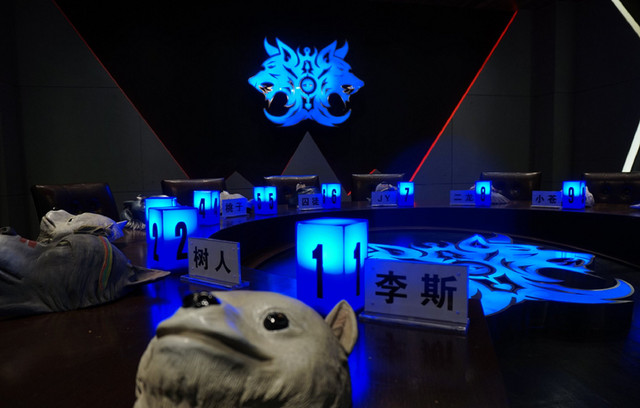
Photo from: JY club
What amazed us the most was how people’s social behavior changed.
As we were settling into our places, there was barely any conversation amongst the players, but as soon as we slipped into our various identities, we became open and ruthless, unafraid to confront one another with wild accusations. During the first round of testimonies, a young female player sitting opposite us coldly accused both of us of being werewolves because “you guys are trying too hard to be dumb” – when in reality, the two of us really had no clue what was going on. But thus accused, we snapped into the game, and began fabricating stories and throwing accusations at others. The intensity of our interactions was truly astonishing.
Afterwards, players went on discussing what happened, appraising each other’s techniques and lies. The girl who so viciously accused us of playing dumb came by to pat us on our shoulders. “Not bad for first-timers,” she said with a warm smile.
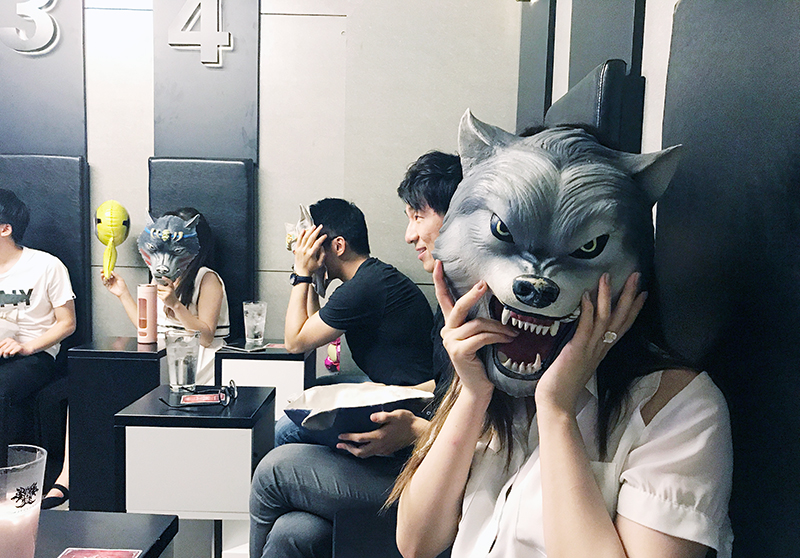
Smile you, wolf!
Mobile all the Way
In December 2016, The Werewolves and Werewolves Everyday debuted on the Chinese mobile app market. During Spring Festival period – China’s most important holiday, and also when young people have the most time to kill – both apps attracted a large amount of players, quickly drawing attention from investors as well as competing app developers.
As of April, there are more than 40 different Werewolves apps in the iOS app store, with a bunch funded by major venture capitalists. These apps are not just games; by adding social functions such as live streaming, audio chat and gift-sending, users are able to play Werewolves while meeting and interacting with new friends, cultivating rivalries and friendships, and even searching for hook-ups (reportedly, male users use werewolf apps to hunt for hot young girls), thanks to the game’s ability to construct reality-based fictional identities.

Having tried out Werewolves in a physical club, it is now time for us to see what's going on in the digital realm. We downloaded two popular apps, “Werewolves Every Day” (天天狼人杀) and “Dine with Werewolves” (饭局狼人杀) to play around with.
![]() Biyi: (waiting for the app to install) I am sooo curious about this mobile version of Werewolves!
Biyi: (waiting for the app to install) I am sooo curious about this mobile version of Werewolves!
![]() Yan: I wonder too! Doesn’t the entire fun of this game lay in the interactions? Not only just conversations, but also observing each other’s’ facial expressions, speaking tones and even body gestures. How can you get such a well-rounded experience playing on the mobile screen?
Yan: I wonder too! Doesn’t the entire fun of this game lay in the interactions? Not only just conversations, but also observing each other’s’ facial expressions, speaking tones and even body gestures. How can you get such a well-rounded experience playing on the mobile screen?
![]() Biyi: Well, don’t ever underestimate the power of technology...
Biyi: Well, don’t ever underestimate the power of technology...
But here's the problem: unlike in the real world, where you can ease into a game, everything is controlled by a cold, impersonal virtual moderator inside mobile gaming rooms. There’s none of the fun of covering your eyes at nightfall as the werewolves pick their victims; all you have to do is to follow the instructions that pop up on your screen.

Dine with Werewolves game in action.
In both Werewolves Every Day and Dine with Werewolves, players can choose to speak either with audio or video when it comes to their turn. This is where things get messed up. We encountered people who scolded / insulted others until they went offline, had connections dropped due to poor connectivity, and endured many long, boring speeches by random faces from weird camera angles. One player was multitasking, seemingly preparing a package while giving his testimony. Halfway through, he disappeared, and the rest of us, not knowing whether or not he’d return, could do nothing except hold our phones and wait like idiots.

Random players we encountered - tell us if this is not awkward...
![]() Biyi: This is awful, playing Werewolf online is no fun at all! Why are earth are we even waiting for him?!
Biyi: This is awful, playing Werewolf online is no fun at all! Why are earth are we even waiting for him?!
![]() Yan: Maybe we just played with the wrong people? There are apparently a lot of professional/highly-skilled Werewolf players in the online community, they’d definitely level up the overall experience for everyone else.
Yan: Maybe we just played with the wrong people? There are apparently a lot of professional/highly-skilled Werewolf players in the online community, they’d definitely level up the overall experience for everyone else.
![]() Biyi: Or maybe not. I think the fundamental problem of playing online is that you just lost the kind of immersive, nuanced connections with other players, unless you are only playing for the sake of winning and don’t care about the social aspects at all.
Biyi: Or maybe not. I think the fundamental problem of playing online is that you just lost the kind of immersive, nuanced connections with other players, unless you are only playing for the sake of winning and don’t care about the social aspects at all.
So, what are our takeaways after an intense week with the Werewolves?
For one thing, we did find Werewolves to be an extremely fun, exhilarate game (and we will definitely play more soon). But more importantly, we are astonished by Chinese entrepreneurs' creativity in renovating and rebranding this game -
In today's China, Werewolves is not just a singular product/a static experience, but a flexible medium (or an “IP”, as Chinese tech folks like to call) delivering multidimensional story-telling to the mass audience. From livestreaming, TV shows to mobile apps, from offline to online to now offline again (there are now more and more Werewolves clubs opening in Chinese cities), the game has established itself as a wholesome, immersive experience that lures capitals, entrepreneurs and consumers.
In the end of the day however, Werewolves is as much about celebrating digital entertainment as about connecting individuals. Being the lonely and insecure social animals as we are, sometimes, all we need is an excuse to really communicate with people. With masks on and roles assigned, Werewolves makes that possible.
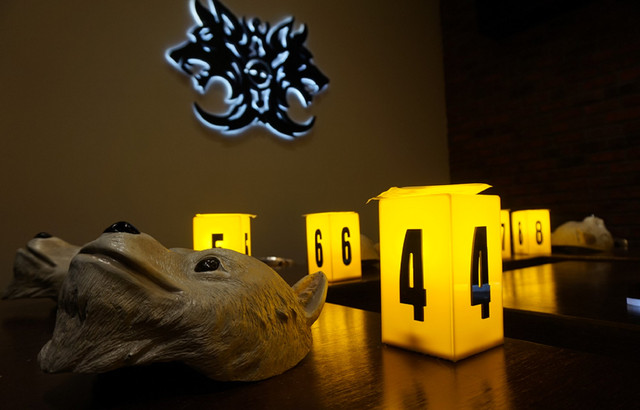
What happens in the game, doesn't just stay in the game.

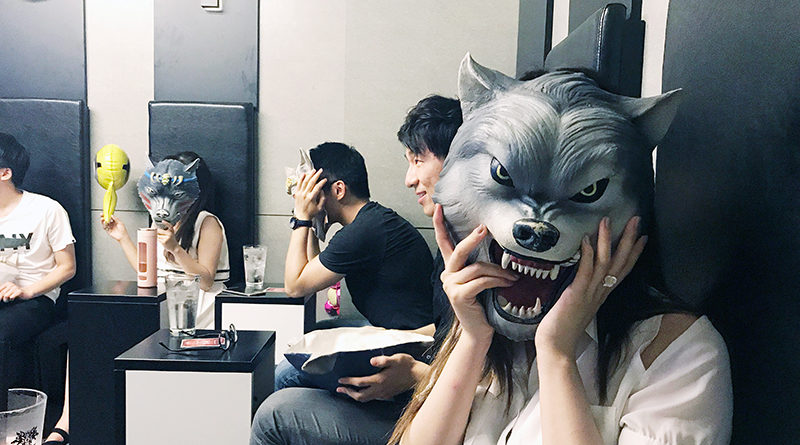
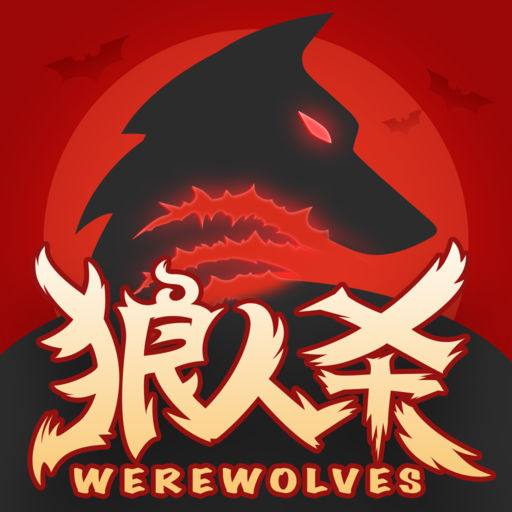
[…] right into a TV show. So that they had celebrities enjoying this sport as a TV show, and that gained a ton of recognition as […]
[…] into a TV show. So that they had celebrities enjoying this recreation as a TV present, and that gained a ton of popularity as […]
[…] into a TV present. So they’d celebrities taking part in this sport as a TV present, and that gained a ton of recognition as […]
[…] 转为电视剧. 所以他们让名人玩这个游戏作为电视节目, 获得了大量的人气 […]
[…] transitioned into a TV show. So they had celebrities playing this game as a TV show, and that gained a ton of popularity as […]